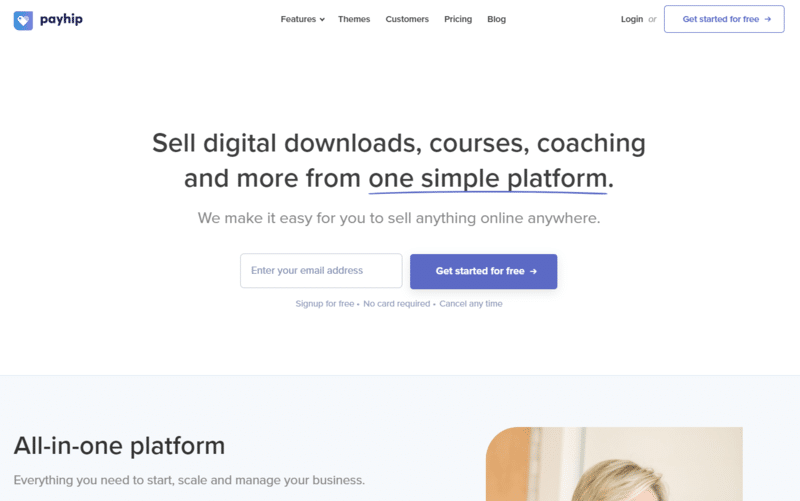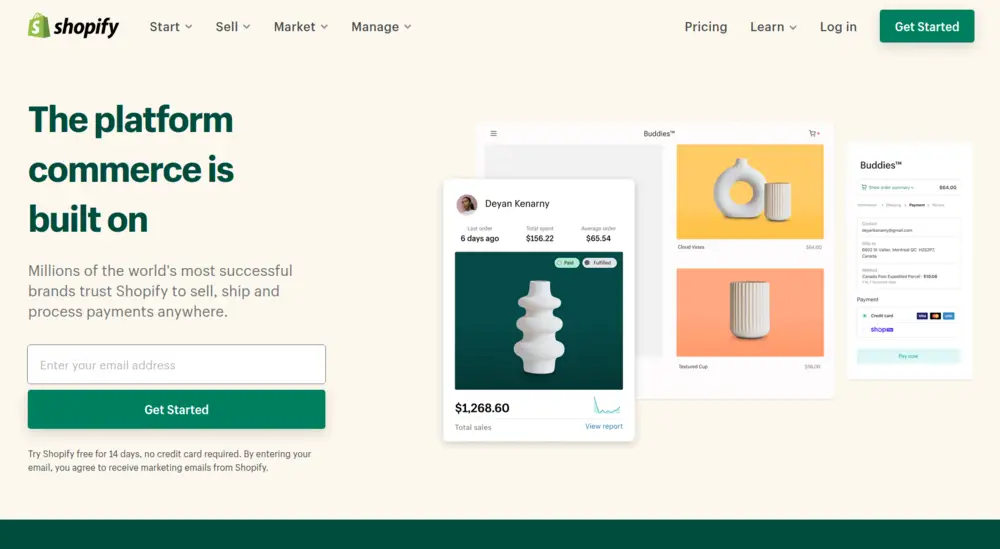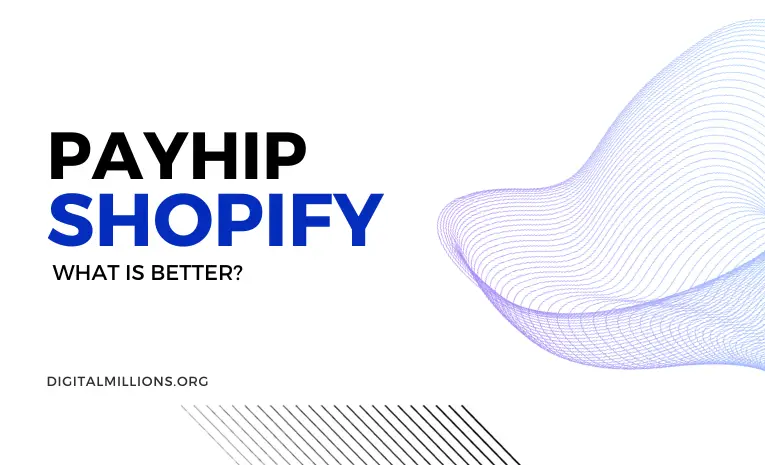Two popular options for selling digital products online are Payhip and Shopify. While both platforms offer unique features and benefits, it can be challenging to determine which one is the best fit for your specific needs.
Payhip is a simple platform designed specifically for digital creators. It offers a straightforward and easy-to-use interface to help creators can sell digital downloads, online courses, memberships, and physical products. Payhip also offers marketing tools, email marketing, and themes to help creators build their brands and grow their businesses.
However, Shopify is a comprehensive SEO-friendly eCommerce platform that caters to businesses of all sizes. It comes with tons of powerful features, including a website builder, inventory management, payment processing, and more.
In this blog post, we will compare Payhip vs Shopify, exploring the best features, pricing plans, pros and cons of each platform.
In this article:
By the end, you’ll have a clear understanding of which platform is best suited for your specific online selling requirements.
So, let’s find out which one wins the battle of Payhip vs Shopify!
Payhip vs Shopify: Summary
- Both Payhip and Shopify are reputed e-commerce platforms.
- Payhip is tailored for digital creators, offering a simple interface with useful features like marketing tools, affiliate programs, and VAT compliance, all at a lower cost with plans ranging from free to $99/month.
- Shopify is a more comprehensive platform aimed at businesses of all sizes, excelling in the sale of physical products but also accommodating digital sales. It boasts an extensive app store, professional design options, and robust SEO tools, with plans from $29/month to $299/month.
- While Payhip is celebrated for its affordability, particularly with lower transaction fees ranging from 0% to 5%, Shopify is recognized for its extensive features, customization options and 24/7 support.
- Despite their differences, both platforms offer ease of use with their intuitive interfaces, making the setup and management of online stores accessible for users at any skill level. Both platform offers free trial.
Payhip vs Shopify: Differences
| Feature/Aspect | Payhip | Shopify |
|---|---|---|
| Launch Year | 2011 | 2006 |
| Target User Base | Creators, small business owners, course instructors | Small to large businesses, online retailers |
| Core Focus | Selling digital and physical products, especially courses | Comprehensive e-commerce platform for all product types |
| Pricing Range | $0/m (with 5% transaction fee) to $99/m | $29/m to $299/m |
| Free Plan Available | Yes | Yes (14-day free trial) |
| Transaction Fees | 0% to 5% depending on the plan | Variable (additional fees for third-party payment gateways) |
| Payment Gateway Integration | PayPal, Stripe | Over 100 options including PayPal, Stripe, Amazon Pay |
| User-Friendly Interface | Yes | Yes |
| Website Builder Included | Yes | Yes |
| Customization Options | Limited | Extensive |
| Marketing Tools | Coupons, social discounts, affiliates, email lists | Email marketing, discount codes, SEO tools |
| Email Marketing Integration | Yes | Yes |
| Customer Support | Email, comprehensive FAQs | 24/7 support via email, live chat, phone |
| Inventory Management | Basic | Advanced |
| App Store/Third-Party Apps | Limited | 3,000+ apps available |
| Multi-Currency Support | Yes | Yes |
| SEO Tools | Basic | Advanced |
| Physical Products Support | Yes | Yes |
| Digital Products Support | Specialized | Available with additional apps |
| Hosting & Performance | Standard | High-performance with global CDN |
| Mobile App | No | Yes |
| Sales Channels | Embed into other websites, social media integration | Online store, social media, online marketplaces |
| Reporting and Analytics | Basic | Advanced |
| Multi-Language Support | Limited | Yes |
| Community and Learning Resources | Yes | Extensive (Shopify Academy, community forums) |
| SSL Certificate | Included | Included |
| Global Reach | Yes | Yes |
| Try Payhip ⟶ | Try Shopify ⟶ |
Payhip vs Shopify: Overview
About Payhip

Payhip is an online e-commerce platform that allows creators to sell digital and physical products.
It is a Shopify alternative that is specifically designed for small businesses and individual creators who are looking for an all-in-one solution to sell their products online. Payhip offers a user-friendly interface and a wide range of features that make it easy to set up an online store and start selling products.
In short, it’s a simple but effective solution for executing online transactions and selling products.
This platform streamlines sales with user-friendly features like customer reviews, marketing tools (discount codes and affiliate programs), and embedding options for easy integration into other websites.
Features of Payhip
Delving into the world of Payhip, we find a myriad of features that make it a go-to platform for selling digital products. Catering to creators, this e-commerce solution checks many boxes.
- All-in-one solution: Payhip provides an all-in-one solution that allows creators to sell both digital and physical products, manage their inventory, and process payments all in one place.
- User-friendly Interface: The platform is designed with simplicity in mind.
- Affordable Pricing: Unlike some other platforms, Payhip’s paid monthly subscription fee won’t break the bank. It also comes with a free account that’s enough for beginners.
- Marketing Tools: Enhance your sales strategy with built-in marketing tools such as discount codes.
- Affiliate Programs: Payhip includes an affiliate program feature that lets you reward people who bring you new customers for your business – a valuable asset for growth.
- Embedding Functionality: The platform allows you to embed your products on other websites.
- Payment Gateways: Payhip supports the most popular payment methods – PayPal and Stripe.
- VAT Compliance: A crucial feature for businesses selling in Europe; Payhip automatically handles VAT on all EU orders.
- Multiple Languages and Currencies: This feature allows you to cater to a global audience by offering your products in various languages and accepting multiple currencies.
Benefits of Using Payhip
Some of the key advantages of Payhip include:
- Lower monthly subscription fee compared to other e-commerce platforms
- Lower transaction fees, allowing for higher profit margins
- You can sell digital products, including courses, memberships, online coaching, and physical products
- Ability to embed Payhip into other websites, expanding your reach
- Secure payment processing through trusted gateways like PayPal and Stripe
- Easy-to-use interface and intuitive order management system
- Dedicated support team ready to assist with any issues or questions
Overall, Payhip is a great option for small businesses and individual creators who are looking for an affordable and easy-to-use e-commerce platform that offers a range of useful features and benefits.
About Shopify

Shopify is a popular ecommerce platform that allows you to create your own online store and sell products easily. It provides all the tools and features you need to set up a professional-looking website, manage inventory, process payments securely, and handle customer orders.
Shopify offers a wide variety of website themes and templates too!
So, designing a visually appealing and professional website becomes as easy as dragging and dropping elements into place.
Launched in 2006, Shopify has quickly become one of the leading e-commerce platforms online. It was founded by Tobias Lütke, Daniel Weinand, and Scott Lake, with the aim: Easy online store setup for everyone.
With Shopify, you can sell both physical products like clothing or gadgets, as well as digital products such as e-books, online courses, and more. It provides a user-friendly platform that doesn’t require any coding skills to get started.
Whether you’re a small business owner or an aspiring entrepreneur, Shopify offers the flexibility and functionality to help you build and grow your online business successfully.
When it comes to managing your products, Shopify offers a robust inventory management system. You can easily add and categorize products, set their prices, track stock levels, and even create product variants like size, color, or style. The platform also allows you to offer discounts, run promotional campaigns, and manage customer reviews effectively.
Features of Shopify
The top features of Shopify include:
- Efficient Ecommerce Tools: Shopify provides a comprehensive set of tools and features to manage your online store effectively. From inventory management to order processing, you can streamline your operations and improve efficiency.
- Professional Store Design: With a wide selection of world-class themes, Shopify allows you to create a visually stunning online storefront that represents your brand perfectly. You can also customize the design to match your unique style and showcase your products in an attractive way.
- Extensive App Store: Shopify offers an extensive app store with thousands of third-party apps that integrate seamlessly with your online store. These apps provide additional functionality such as marketing tools, customer support, and analytics, allowing you to enhance the overall performance of your business.
- Secure Payment Processing: Shopify supports multiple payment gateways, including its own integrated solution, Shopify Payments. This ensures safe and secure transactions for both you and your customers. Plus, it simplifies the payment process by automatically handling taxes and shipping rates.
- SEO-Friendly Features: Shopify includes built-in SEO tools that help improve your website’s visibility in search engine results. You can optimize individual product pages, create custom URLs, and generate sitemaps to boost organic traffic and attract more potential customers.
- Mobile-Friendly Experience: In today’s mobile-driven world, having a responsive website is crucial for success online. Shopify provides mobile-friendly themes that adapt to different screen sizes and devices, ensuring a seamless shopping experience for customers on smartphones or tablets.
- Reliable Hosting and Performance: With unlimited bandwidth, storage space, free SSL certificate, and PCI-compliant servers, Shopify ensures fast loading times and secure data transmission for your website. Additionally, their global CDN (Content Delivery Network) guarantees excellent performance worldwide.
- Blogging Platform: Beyond just selling products, Shopify offers a built-in blogging platform that allows you to create content-rich blog posts. This can be a valuable tool for content marketing, improving SEO, and engaging with your audience on a deeper level.
- Excellent Customer Support: Should you encounter any issues or need assistance with your online store, Shopify offers 24/7 customer support through various channels like live chat, email, and phone.
Benefits of Using Shopify
Using Shopify offers several benefits for online businesses:
- Dropshipping integration: Shopify makes it easy to connect with dropshipping suppliers and automate order fulfillment.
- Flexible shipping rates: Set up customized shipping options based on weight, location, or order value.
- Multi-language support: Reach customers around the world by offering your online store in multiple languages.
- Product reviews: Enable customer reviews on your product pages to build trust and credibility with potential buyers.
- Gift vouchers: Boost sales by allowing customers to purchase gift vouchers that can be redeemed in your store.
- Wide selection of third-party apps: Enhance your store’s functionality by integrating with various third-party apps.
So far, we’ve learned a lot about Payhip and Shopify. Now, we’ll compare Payhip vs Shopify in terms of ease of use, pricing, website builder, hosting performance, customer support, and more.
Payhip vs Shopify: Ease of Use
Both Payhip and Shopify offer user-friendly interfaces. Beginners can easily set up and manage their online stores.
Payhip’s dashboard is intuitive and straightforward. You can quickly upload products, manage orders, and customize your store. Similarly, Shopify provides a user-friendly admin area, enabling you to design your website and manage your business efficiently. You can also find mobile apps for both platforms for managing your store on the go.
So, whether you choose Payhip or Shopify, ease of use won’t be a problem.
Payhip vs Shopify: Pricing Plans
When it comes to the pricing structure, both Payhip and Shopify have different plans with varying features. However, Payhip’s subscription plans tend to be cheaper than Shopify’s.
| Payhip Pricing (monthly billing) | Shopify Pricing (monthly billing) |
|---|---|
| $0 per month + 5% transaction fee | $39 per month + 2.9% + 30¢ per transaction |
| $29 per month + 2% transaction fee | $105 per month + 2.6% + 30¢ per transaction |
| $99 per month + 0% transaction fee | $399 per month + 2.4% + 30¢ per transaction |
Despite the lower monthly subscription fee, Payhip’s transaction fees are generally lower than Shopify’s. It makes Payhip a more cost-effective option, especially for businesses that process a high volume of transactions. However, Shopify offers a more robust set of features in their plans, which could justify the higher cost for some businesses.
Payhip vs Shopify: Website Builder
Shopify offers a website builder that gives users access to a vast selection of themes from various sources, including the Shopify theme store, ThemeForest, and developers. With Shopify’s website builder, you can fully customize your site using sections for building custom pages and making general theme settings.
On the other hand, Payhip provides a more limited selection of free themes and customization options for pages, headers, footers, fonts, colors, and buttons. While Payhip’s website builder may not have all the bells and whistles like SEO options found in Shopify’s platform, it still provides basic tools to help you create a beautiful online store.
Payhip vs Shopify: Hosting
Both Payhip and Shopify offer hosting services for your online store.
However, Payhip provides limited information about its hosting details, which makes it difficult to assess the quality of its servers and infrastructure. But, in my experience, I’ve found it to be a robust and reliable hosting infrastructure. Selling your digital products and handling automated delivery and payments shouldn’t have any issues in most cases.
On the other hand, Shopify offers robust hosting features such as unlimited bandwidth and storage, PCI-compliant servers, a free SSL certificate, and a global content delivery network (CDN).
These features ensure that your website loads quickly and can handle high volumes of traffic without any issues.
Shopify is designed to scale as your business grows.
Overall, when comparing Payhip vs Shopify in terms of web hosting, Shopify stands out for its transparency, reliable infrastructure, and seamless integration with its e-commerce platform.
Payhip vs Shopify: Customizability
When comparing Payhip and Shopify in terms of customization options, Shopify is a clear winner.
Shopify offers more flexibility and choices for users. With Shopify, you have access to a wide range of themes from various sources, allowing them to find the perfect design for your online store.
Additionally, Shopify provides a full site customizer with code access. So, you can customize every aspect of your website according to your needs and preferences. Also, there is an overload of apps and integrations available in the Shopify App Store that further enhance the customizability of your online store. These apps can help you add specific functionalities, integrate third-party services, and optimize various aspects of your e-commerce site.
On the other hand, Payhip offers a smaller selection of free themes and limited customization options.
Payhip is designed to be a more streamlined and straightforward platform. It can be useful for those who want to quickly set up an online store without delving into extensive customization. However, if you’re looking for in-depth control over the look and feel of your online store, Shopify’s robust customization features are the way to go.
It’s worth noting that with great customization power comes a steeper learning curve. So, for those who want an easy-to-understand platform to quickly start selling their products online, Payhip is an excellent option.
Payhip vs Shopify: Support Options
Payhip offers customer support through email tickets. You can also take help from their Help Center.
However, when it comes to customer support options, Shopify takes the lead. Shopify provides 24/7 support through multiple channels, including phone, live chat, email, and Twitter.
This comprehensive range of communication channels ensures that users can get assistance whenever they need it. In contrast, Payhip’s support options are limited when compared to Shopify.
Payhip vs Shopify: Pros and Cons
Pros and Cons of Payhip
| Pros of Payhip | Cons of Payhip |
|---|---|
| Payhip is focused on selling digital products, making it an ideal platform for creators and educators. | Payhip’s site builder lacks SEO options, which may affect your website’s SEO performance. |
| It lets you sell all kinds of digital products, including downloads, courses, memberships, and coaching. You can also sell physical products if you wish on the Payhip platform. | Its customization options are limited compared to most other platforms, including Shopify. |
| Payhip has lower monthly subscription fees compared to many other e-commerce platforms, making it a cost-effective choice for small businesses and startups. | If your business relies heavily on physical products, Payhip might not be the best choice as it is primarily designed for digital product sales. |
| This platform includes beneficial features such as customer reviews, the ability to embed into other websites, and marketing tools such as coupon codes and affiliate programs. | The website builder of Payhip doesn’t let users access codes for more advanced customization. |
Pros and Cons of Shopify
| Pros of Shopify | Cons of Shopify |
|---|---|
| Shopify offers an extensive range of features including support for dropshipping, flexible shipping rates, product reviews, and gift vouchers, thus making it possible to run a thriving e-commerce business. | The platform’s pricing structure could be a barrier for many individuals and businesses. In comparison to Payhip, Shopify’s monthly subscription fee is higher. |
| Shopify supports multi-language which makes it a go-to platform for businesses that have a global customer base or plan of expanding internationally. | The transaction fees on Shopify can be relatively high. Although it varies depending on the pricing plan, it’s generally higher than what is available on Payhip. |
| Shopify offers robust website-building features. It comes with a vast selection of themes from 3rd-party sources and offers a full website customizer. Users can access the theme’s code for more advanced customization. | For the inexperienced, the wide array of features and customization options Shopify provides can be overwhelming. It might take some time to get comfortable. |
| Shopify has the ultimate edge in the availability of third-party apps. These apps help enhance the functionality of the platform, enabling individuals and businesses to extend their capabilities and reach. | Though Shopify’s support for third-party apps is a boon, it can also become a bane if these apps are not regularly updated or are not compatible with the latest software updates. It can potentially lead to glitches and other issues. |
Related Reading:
- Umbraco vs WordPress: Which CMS is Best for Your Business?
- 10 Best Payhip Alternatives & Similar Competitors
- Digistore24 vs Clickbank: Which One is Better for Affiliates?
- SE Ranking vs Semrush: Which SEO Tool Is The Best?
- 10 Best WP Rocket Alternatives With Free & Paid Options
Payhip vs Shopify: Final Verdict
In conclusion, Payhip and Shopify are both powerful e-commerce platforms for selling digitally. Both are good for SEO too.
Payhip is a great choice for those selling digital products, offering a cheaper subscription fee, lower transaction fees, and specific features for different product types. On the other hand, Shopify provides a wide range of useful features suitable for selling physical products, including dropshipping integration and flexible shipping rates.
So, as you can see, one major difference is the focus:
Payhip is primarily designed for selling digital products, while Shopify caters more to physical product sellers. Also, Payhip generally has a lower monthly subscription fee compared to Shopify. So, you can save money on monthly subscriptions and keep more of your profits with Payhip.
You can also sell memberships on Payhip. This e-commerce platform allows you to offer recurring payment options for your customers, whether it’s for access to digital downloads or membership groups.
You have the flexibility to set up different tiers or subscription levels for your memberships and easily manage recurring payments. Whether you’re selling online courses, exclusive content, or coaching services through 1:1 sessions, Payhip provides the necessary tools to support business model.
Payhip is already used by 130,000 creators.
But honestly, when compared to Shopify’s user base, it’s nothing. They have approximately 2.1 million daily active users using the platform.
Both platforms let you choose popular payment options like PayPal, Stripe, and credit/debit card payments.
I guess I’ve discussed almost all the key points you need to know about Payhip and Shopify for your e-commerce needs. Ultimately, the decision between Payhip and Shopify depends on what you need.



